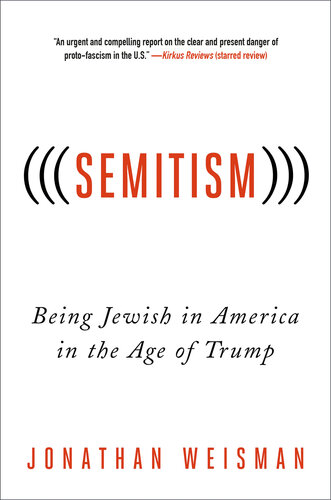
(((Semitism)))--Being Jewish in America in the Age of Trump
کتاب های مرتبط
- اطلاعات
- نقد و بررسی
- دیدگاه کاربران
نقد و بررسی

December 18, 2017
Weisman (No. 4 Imperial Lane), the New York Times’ deputy Washington editor, offers a chilling look at resurgent anti-Semitism in America in the wake of Donald Trump’s political ascendancy. Despite feeling only minimally connected to his Jewish heritage, Weisman found himself the target of “alt-right” Trump supporters in 2016 after tweeting an excerpt from an editorial about the rise of fascist tendencies in the U.S.; within minutes, he received a response addressed to “(((Weisman))),” punctuation that he learned was “wrapped around Jewish-sounding names on social media” by online harassers. That response was the precursor to a torrent of online hate he received, which shook Weisman out of his complacency and forced him to face the reality of persistent anti-Jewish bias. He provides a thoughtful and deeply personal account of his struggle to understand what was happening. The hostility Weisman encountered was so overwhelming that his daughter sought reassurance that she didn’t “look Jewish,” which she feared would put her at risk of being targeted as well. Despite that close-to-home evidence of the effectiveness of the bigots, Weisman concludes forcefully, leaving readers with the message that the best way for Jewish Americans to resist bigotry is to champion “liberal internationalism in the oldest, least partisan sense of that phrase.” Agent: Rayhane Sanders, Massie & McQuilkin.

Starred review from December 15, 2017
After becoming a victim of unhinged anti-Semitic hatred, trolled and cyberstalked by fringe-right bigots, a journalist delivers his forceful response.Weisman (No. 4 Imperial Lane, 2015), the deputy Washington editor of the New York Times, once reported on the activities of a neoconservative, journalism that provoked alt-right activists on social media. Under the cover of "free speech," they openly expressed their prejudice against Jews in general and the author in particular. Certainly, the author notes, anti-Semitism in the U.S. is hardly new. He recalls the lynching of Leo Frank, the bile spewed by Charles Lindbergh, and other examples. Erstwhile good feelings engendered during the civil rights movement eventually collapsed, and Judaism and its adherents became conflated with the State of Israel. Now, anti-Semitism is flourishing in the Trump era, and what was unacceptable once now swims in the mainstream. With reportorial skill, the author brings us up to date on activities of current hate groups and their leaders. The titular meme--three parentheses ("echoes") around a proper noun--is a dog whistle signaling, for those attuned to it, "Jew." Today, marchers in Nazi regalia parade, and swastikas and graffiti abound; harassment, trolling, and cyberstalking are essential tools in the alt-right kit. So what can be done? What should American Jews do? Weisman issues a call to arms in defense of truth. We must organize and fight, he urges, using the internet and social media. Jews, the "Other," must ally with other Others like African-Americans and immigrants. The author also recommends toning down the obsession with Israel and supporting organizations like the Anti-Defamation League and the Southern Poverty Law Center. "The moral response is imperative," writes Weisman. "Morality can inform tactics." For now, though, the value of his brief text remains the light he shines on the current state of bigotry.An urgent and compelling report on the clear and present danger of proto-fascism in the U.S.
COPYRIGHT(2017) Kirkus Reviews, ALL RIGHTS RESERVED.

























دیدگاه کاربران